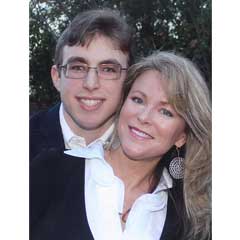 | |


When Susan Butler found out her son, Collin Butler, was diagnosed with autism, she was heartbroken.
The news no parent wants to hear set her on a path to help Collin, as well as other kids like him, achieve what seemed impossible. Susan brought Applied Behavioral Analysis (ABA), an effective way to treat young people with autism, to South Carolina, through the South Carolina Early Autism Project, which she started with Collins preschool teacher, Ann Eldridge, in 1996. The organization offers individualized research-based treatment to thousands of children and young adults from 20 months to 21 years old. To see the transformation of so many kids that we work with reminds me how far we've come as an organization, Susan tells PEOPLE. Collin, now 22, was your typical baby. He was all smiles one minute and hysterical the next. Once he reached 14 months, things started to change. He lost words he once knew and began communicating less and less. Because he had trouble speaking, he would throw tantrums to get what he wanted. It was really hard for him because he was such a smart little fella and had so much potential, Susan says. Collins story Susan took him to three different pediatricians in Sumter, South Carolina, where they lived at the time, before finally getting the diagnosis. But there was still no solution and Susan was worried about Collin entering preschool. She called UCLA, where doctors were making progress with ABA treatment. Butler and her husband, Joe Butler, were referred to a similar program out of Wisconsin – the Early Autism Project. After numerous calls, Dr. Sallows, head of the program, agreed to take Collin on as a workshop case. Susan and Ann were movers and shakers down in South Carolina and have really made a difference for the state, Dr. Sallows tells PEOPLE. Applied Behavioral Analysis treatment is the most powerful invention I know and was happy to find out that they were bringing the treatment there. During the summer of 1996, Dr. Sallows flew to South Carolina and started the program with Collin. On a Friday afternoon, Susan sat on her living room floor with Eldridge, four therapists, two babysitters and a speech therapist. They all watched as Dr. Sallows developed a special treatment specifically for Collin. It was tough at first. Collin shouted and was physical toward Dr. Sallows. He would punch and dig his nails into his skin. After evaluating Collin by asking him questions, Dr. Sallows learned what he was capable of and put together a custom treatment for him. |
|


